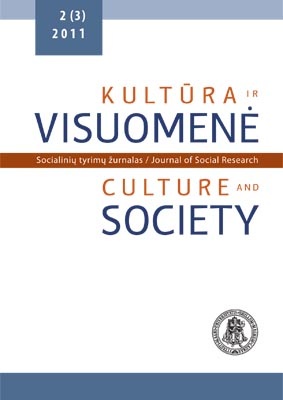Musulmonų bendruomenių reakcija į sekuliarizacijos procesą Lietuvoje
Muslim Communities’ Response to the Secularization Process in Lithuania
Author(s): Vaida Norvilaitė, Egdūnas RačiusSubject(s): Cultural Essay, Political Essay, Societal Essay
Published by: Vytauto Didžiojo Universitetas
Keywords: sekuliarizacija; islamas; Lietuvos musulmonai; totoriai; konvertitai; imigrantai; secularization; Islam; Lithuanian Muslims; Tatars; converts; immigrants
Summary/Abstract: Religingumo Lietuvoje studijose iki šiol praktiškai neskirta dėmesio musulmonų bendruomenei. Tačiau žiūrint perspektyviai ir atsižvelgiant į platesniame kontekste (ypač Europoje) vykstančius procesus, tokius kaip musulmonų skaičiaus augimas ir, dar svarbiau, jų lūkesčių ir reikalavimų, susijusių su religinėmis normomis (tiek ritualų, tiek kasdienio gyvenimo srityse), gausėjimas, galima daryti prielaidą, kad didžiausias sekuliarizacijos Lietuvoje (kaip ir kitur Europoje) iššūkis jau netolimoje ateityje kils ne iš religinei daugumai atstovaujančių bendrijų, bet būtent iš musulmonų – tiek imigrantų ir jų palikuonių, tiek konvertitų. Todėl musulmonų požiūris į sekuliarizacijos procesą Lietuvoje yra fiksuotinas jau dabar, kad būtų galima ne tik adekvačiai suprasti musulmonų nuotaikas, bet ir pasiruošti deramai reaguoti į galimus jų veiksmus. Šiame straipsnyje siekiama parodyti, kad, nepaisant mažumo, Lietuvos musulmonų bendruomenė nėra vieninga sekuliarizacijos klausimu. Pasitelkus ilgalaikės Lietuvos totorių bendruomeninės veiklos (ypač religinės) stebėsenos ir konvertitų kokybinio tyrimo1 rezultatus atskleidžiama, kaip tam tikri Lietuvos musulmonų bendruomenės segmentai (ar net paralelios Lietuvos musulmonų bendruomenės) reaguoja į sekuliarizacijos procesą Lietuvoje. Muslims have been and continue to be an integral part of the Lithuanian society since at least the 15th century. However, the newly independent post-Communist Lithuania has been witnessing (re)appearance of Islam on its soil, where the revived indigenous Tatar Muslim community is gradually being supplemented by immigrant Muslims and even more so by a steadily growing group of Lithuanian converts and their progeny. The Soviet period facilitated rapid secularization among Tatars, majority of whom, even after Lithuania regained its independence and faith communities were once again allowed to freely and publicly practice their religion, remain non-observant if not altogether agnostic. As has become evident from a long-term observation of their communal religious activities and interviews with their communal (both religious and lay) leaders, the absolute majority of the Lithuanian Tatars today see religion of Islam as a mere cultural feature related to their ethnicity. Unlike Tatars, the bulk of Lithuanian converts to Islam, who might tentatively be viewed as a core of the observant part of the Muslim community in Lithuania, as has been revealed in a qualitative research and from their intra-community online communication, are exceptionally religious and observant. Consequently, the two groups construct their view of and relationship with the secularization process in Lithuania in almost diametrically opposite directions – while Tatars seem to be content with it, converts appear eager to stop or even reverse it.
Journal: Kultūra ir visuomenė: socialinių tyrimų žurnalas
- Issue Year: II/2011
- Issue No: 3
- Page Range: 49-66
- Page Count: 18
- Language: Lithuanian

